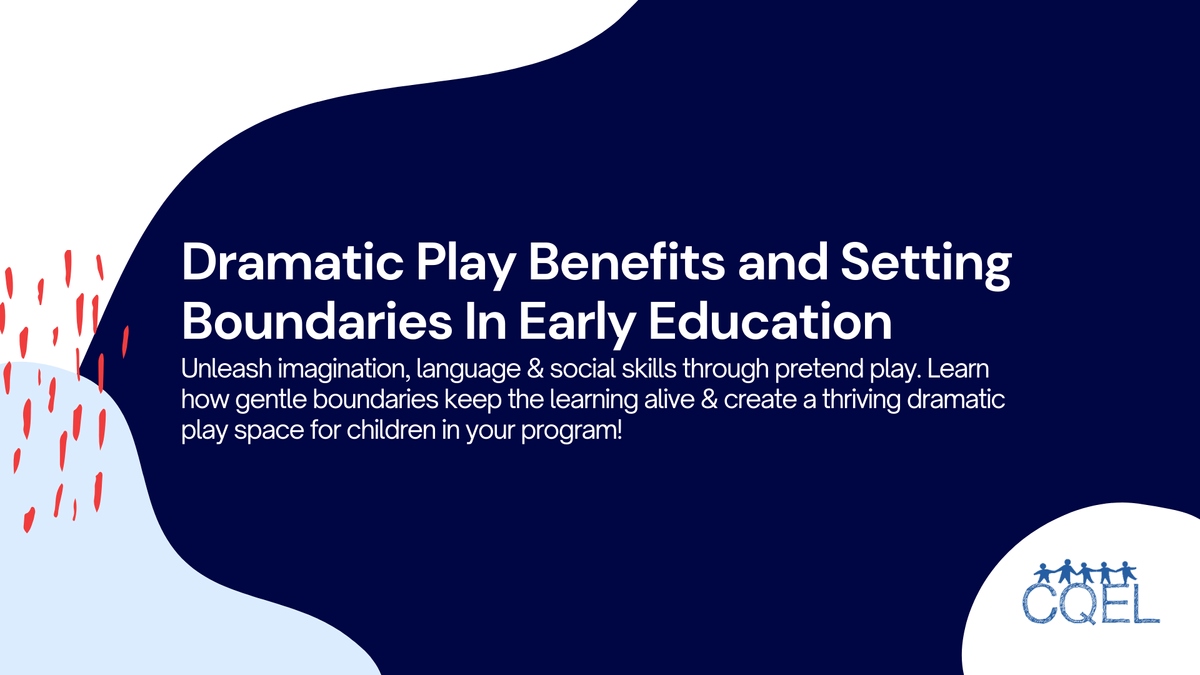Dramatic Play Benefits and Setting Boundaries In Early Education
Unleash imagination, language & social skills through pretend play. Learn how gentle boundaries keep the learning alive & create a thriving dramatic play space for children in your program!

Imagine a classroom transformed into a bustling marketplace, a spaceship blasting off to distant galaxies, or a cozy cafe serving up pretend treats. Dramatic play, the cornerstone of early childhood education, isn't just about fun and games; it's a powerful tool for fostering a child's development. Through pretend play, children ignite their imaginations, blossom their language skills, and build essential social skills – all within a safe and stimulating environment. But just like any magical world, the dramatic play space thrives with a touch of structure. Let's explore the wonders of dramatic play and how to set gentle boundaries to keep the learning magic alive.
The ability to imagine is a cornerstone of cognitive development. Dramatic play allows children to step outside the ordinary, experiment with different roles and scenarios, and explore the world around them in a creative and meaningful way. Imagine a child pretending to be a doctor examining a stuffed animal patient. This play not only sparks their imagination but also allows them to practice empathy and problem-solving skills. Research even suggests a link between dramatic play and early literacy development, as children create narratives, use descriptive language, and practice storytelling while engaged in pretend play.
Language flourishes on the stage of dramatic play. As children interact with each other, negotiate roles, and create imaginary scenarios, their vocabulary blossoms. They experiment with sentence structure, practice using verbs and adjectives, and learn the power of communication for getting things done. Dramatic play can also be a powerful tool for supporting children learning new languages. By acting out everyday routines or familiar stories, children can practice new words and phrases in a fun and engaging way. Imagine a group of children setting up a pretend restaurant – they'll be using numbers to take orders, practicing greetings in different languages, and all the while, solidifying their language skills through active play.
The world of dramatic play is a stage for social development. Children learn to cooperate, take turns, and negotiate as they navigate roles, create a shared imaginary world, and resolve conflicts that may arise during play. Taking on different roles allows children to develop empathy and understand the perspectives of others. Imagine a child pretending to be a firefighter rescuing a teddy bear from a burning building. Through this play, they're not just practicing bravery; they're also developing a sense of responsibility and understanding the importance of helping others. Dramatic play fosters teamwork and builds friendships as children learn to collaborate and share ideas to bring their pretend worlds to life.
While dramatic play thrives on imagination, boundaries are essential for maintaining a safe and positive learning environment. Clear boundaries ensure the safety of all children, respect for materials, and inclusion for everyone who wants to participate. Setting boundaries doesn't have to stifle creativity; it can actually enhance the play experience. Providing clear expectations at the beginning of playtime, such as gentle reminders to use toys appropriately, and using positive redirection when necessary can help maintain a harmonious play space.
California offers a wealth of resources to support dramatic play in early childhood education settings. The California Department of Education's Early Learning and Development Standards (https://www.cde.ca.gov/sp/cd/re/) outline a framework for creating stimulating dramatic play environments that nurture a child's development.
Dramatic play allows children to explore their imaginations, develop essential social skills, and blossom their language skills in a safe and engaging way. By fostering a stimulating play environment and setting gentle boundaries, you can transform your classroom into a stage where the magic of learning comes alive. So, embrace the power of pretend play and watch your students soar! After all, in the world of dramatic play, the possibilities are endless.
